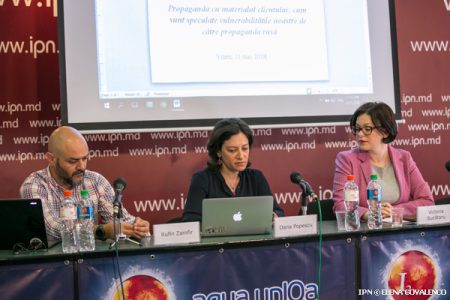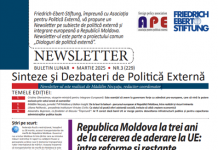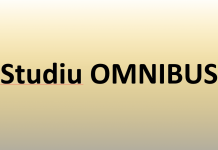When it is about propaganda, either internal of foreign, the governments should identify the threat and should recognize the existence of a danger related to subversion, destabilization of society and the state, misinformation and formalization of this danger in state documents. But this problem cannot be solved by governments only as the people’s distrust in the government of the political class is one of the vulnerabilities. In such conditions, a significant role is played by civil society, said executive director of the Global Focus Center Romania Oana Popescu, who is one of the authors of the study “Propaganda with the client’s material: how are our vulnerabilities to Russian propaganda speculated”.
The study analyzes the situation in four states, namely: Romania, Bulgaria, Georgia and Moldova. This was presented in a press club meeting that was staged by the Foreign Policy Association (APE) at IPN. Oana Popescu said when the crisis of confidence between citizens and the government or the political class is one of the main vulnerabilities in these countries, it is rather improbable that the people, where their mind is the ‘battlefield’, will be protected from this danger only through the intervention of the government that is not trusted by the population.
“The messages coming from the Kremlin, for example, could never be counteracted by messages coming from an own government that is not trusted by the people. Thus, the approach should include the actions of civil society and of the government. Civil society can become involved especially in the education of the population, media education. It is a myth believing that we will be able to persuade the population of something only by indicating the false information as false and by denying the lies that come from outside or from inside the country,” stated the expert.
Oana Popescu noted training courses in the education system are needed and the influence of civil society here would be rather positive. Stimulating the students’ critical thinking would be one of the goals of these courses. The people also need training to be taught how to “watch” TV, how to “read” on the Internet and the NGOs definitely play an important role here.
Within the study, the permeability of external influences in the four states was assessed on a scale of 0 to 3, where 0 means least permeable to external influence and 3 means most permeable. All the four states have a score higher than 1.5. Rufin Zamfir, program director at the Global Focus Center Romania, said the graphic starts with Romania and ends with the Republic of Moldova, which has the highest permeability level, of 2.08. 2.08 is beyond the ceiling defined by sociologists as the crisis ceiling. 2 is the crisis level and any score higher than 2 shows a volatile situation that can easily lead to major imbalances in the perception of the reality.
The press club meeting was supported financially by the Open Society Foundations.







